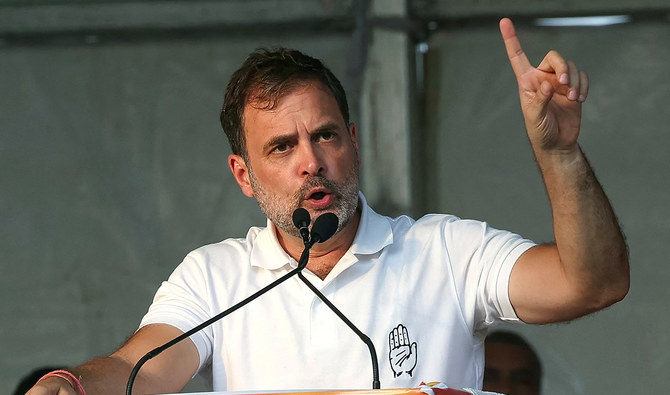NEW DELHI: Indian opposition leader Rahul Gandhi, mocked by Prime Minister Narendra Modi and his supporters for a decade as an entitled dynast, marked a stunning comeback on Tuesday, emerging at the center of an alliance that made deep inroads into ruling party strongholds.
The scion of India’s fabled Nehru-Gandhi political dynasty, he embarked on two cross-country marches against what he called Modi’s politics of hate and fear, giving a jolt of enthusiasm to his Congress party and rehabilitating his own image.
Reduced by a Modi landslide to just 52 seats in the 543-member lower house of parliament in 2019, Congress looks well set to nearly double that tally this year, according to the
vote count from the general election.
That total is likely to restrict Modi’s Hindu nationalist Bharatiya Janata Party (BJP) to less than the 272 seats needed to win a majority on its own, and it will have to rely on allies to form the government.
Though it might have to sit another term out of power, Congress will have the loudest voice in a much stronger opposition, with Gandhi at its center.
As the opposition’s most prominent face, Gandhi has been a target of attacks from Modi and other BJP leaders, who often call him “the prince.”
Gandhi’s father, grandmother and great-grandfather have all been prime ministers.
During the campaign, Gandhi, with close-cropped black hair and a scruffy salt-and-pepper stubble, criss-crossed the country as his party’s main face, even though Congress is led by family loyalist Mallikarjun Kharge.
“I think Rahul Gandhi will get credit, not just for mobilization, for his marches, but also for continuously clarifying the Congress’s ideological pitch against the BJP,” said Rahul Verma, political analyst at the Center for Policy Research think tank in New Delhi.
“If there was a moment when Gandhi really emerged, it is now,” he said.
BATTLE AGAINST HATE
At a news conference on Tuesday, Gandhi pulled out a red-jacketed, pocket-sized version of the country’s constitution that he has referred to continuously during the campaign, and said his alliance’s performance was the “first step” in preventing Modi from attempting to change it.
Changing the constitution requires a two-thirds in parliament.
Cambridge-educated Gandhi has often said that he is battling Modi’s BJP not just to wrest power, but to defeat the party’s and its parent Rashtriya Swayamsevak Sangh’s Hindu-first character, which goes against India’s secular roots enshrined in the constitution.
“My fight is with the ideology of RSS and BJP which is a threat to our country. The hatred these people spread, they spread violence, I fight against it... This is the battle of my life for me,” he said at a party event two years ago.
BJP rejects these charges.
Single at 53, a trained pilot like his father, and a certified scuba diver, Gandhi is known to be a fitness and martial arts enthusiast and has been seen cycling on New Delhi’s leafy avenues, accompanied by security men.
Though he guards his private life tightly, Gandhi allowed a small peek during the peak of the campaign, sharing a video of him playing with and giving belly rubs to his dog named Yassa, who he said was quite sick, leaving Gandhi “very upset and low.”
A member of parliament since 2004, Gandhi’s attendance has been far below average. His frequent absences from the chamber, and the country, have been the focus of the media and drawn BJP accusations that he does not take politics seriously.
LIKENED TO KENNEDYS
Gandhi has never been a minister in a federal or state government, and has not led his Congress party to a general election victory.
Congress was the largest national political party with a footprint across the country of 1.4 billion people until it was overtaken by the BJP in 2014.
Outside parliament, Gandhi has often reminded his supporters of his family’s commitment and sacrifices, talking about assassinations of his grandmother, Prime Minister Indira Gandhi, and of his father and ex-prime minister Rajiv Gandhi.
The Gandhi family still dominates Congress and commands fierce loyalty.
The political lineage, likened to the Kennedys in the United States both for the power it has enjoyed and the tragedies that have befallen it, started with Motilal Nehru, who practiced law in the early 20th century and gave up a Western lifestyle to become president of the Congress party.
His son, Jawaharlal, was independence hero Mahatma Gandhi’s closest confidant and prime minister from 1947 until 1964.
Jawaharlal’s daughter, Indira, married a Gandhi who was no relation to the Mahatma, but the name was certainly no handicap in politics. Indira Gandhi became prime minister in 1966, but was voted out in 1977 after imposing a harsh internal emergency on the country, becoming the first of her family to lose a national election.
But the mystique of the dynasty brought her back to power within three years and her son Rajiv took over after she was shot dead by two bodyguards in 1984. Rajiv Gandhi served one term as prime minister and when he was campaigning for a comeback in 1991, he was assassinated by a suicide bomber.
Those killings have made Rahul, his mother Sonia and sister Priyanka among the most protected people in the world. Armed men in suits and dark glasses guard them at public functions and, for security reasons, Rahul even used a false name at university and when he worked in London at the turn of the century.

























